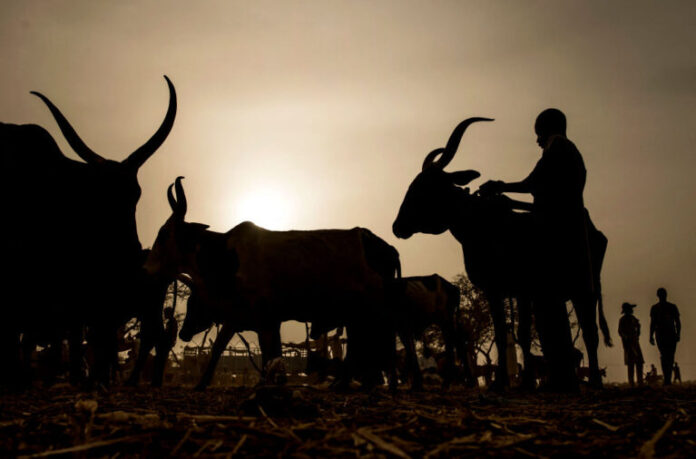In the early hours of an April morning in northeastern Nigeria, Fulani herder Musa and his family were jolted from sleep by gunfire. Forced to flee into the bush for safety, they returned to find their home ransacked and their livestock—36 cattle and 40 sheep—gone, taken by armed militants. Musa’s experience is emblematic of a growing crisis spanning the Lake Chad Basin, Sahel, and West Africa, where livestock theft is becoming a key funding stream for violent extremist groups.
According to a specialist from Cameroon’s University of Maroua, cattle rustling has evolved into a lucrative business for armed groups. “With a single cow valued at over 200,000 CFA francs (about $346), stealing 25,000 cattle could yield more than 5 billion CFA francs—roughly $8.6 million,” he explained, citing figures shared with the Enhancing Africa’s Capacity to Respond More Effectively to Transnational Organized Crime initiative.
Nigeria ranks as the African country hardest hit by livestock theft, followed closely by Mali. Flore Berger, a researcher with the Global Initiative against Transnational Organized Crime, noted that the illegal trade not only strips herders of their economic base but also prolongs and exacerbates regional conflicts.
Since 2011, cattle rustling has intensified in Nigeria, claiming thousands of lives, displacing entire communities, and destabilizing rural economies. Kingsley L. Madueke, another researcher with the initiative, emphasized the widespread ramifications, describing it as a persistent threat to national cohesion.
In Mali, the illegal livestock trade has long been a pillar of the insurgency economy. “Unlike narcotics or ransom demands, cattle theft remains a dependable and enduring revenue stream,” Berger told The Associated Press. Mali’s prominence as a regional cattle exporter means stolen herds can be easily hidden within legitimate ones and trafficked to neighboring countries like Niger, Côte d’Ivoire, and Burkina Faso.
Armed groups often wait at watering points to ambush livestock, according to Mahamad Ag Moustapha, mayor of Inekar in Mali’s Menaka region. He lost over $84,000 worth of cattle in one attack and now lives in a displacement camp. Terrorists use such tactics to intercept livestock, later blending the stolen animals into regular trade flows with the help of traders, intermediaries, and sometimes corrupt officials.
Groups like Jama’at Nusrat al-Islam wal-Muslimin have cornered this illicit market in parts of Mali, Niger, and Burkina Faso, leveraging their territorial control and local networks. Berger explained that these militants rely on structured supply chains involving agents, transporters, butchers, and traders to offload stolen animals.
These networks act as both a logistical lifeline and an intelligence source for jihadists, helping them operate undetected in forested or remote areas. William Assanvo, with the Institute for Security Studies, noted that these “commercial allies” effectively sustain the militants’ presence and activities.
Berger’s research uncovered that Burkina Faso’s Ansarul Islam group reportedly earns 25 to 30 million CFA francs (about $41,000 to $49,000) monthly from livestock theft alone. In a 2024 raid on a hamlet in Niger’s Ouallam region, militants stole more than 600 animals, killing at least one herder during the attack.
Beyond economic damage, cattle theft stokes interethnic hostilities. The Africa Center for Strategic Studies warns that communities with historical grievances may view rustling as a form of revenge. This dynamic has led to the rise of local militias, some of which retaliate violently, further inflaming the conflict. Terrorist factions exploit these divisions to recruit new fighters and expand their influence.
The problem has spread beyond the Sahel. The Armed Conflict Location & Event Data Project recorded a sharp rise in Boko Haram’s cattle rustling activities in Cameroon and Chad, from just two reported incidents in 2015 to 131 between January and August 2024.
In Ghana, stolen cattle often end up at markets near the Burkina Faso border. Clement Aapengnuo of the EU-funded COGINTA NGO said these animals are sold at below-market prices, luring unsuspecting buyers. “People think they’re getting a deal, but they’re unknowingly contributing to terrorism,” he told Deutsche Welle.
To curb this trade, Madueke argues that authorities must dismantle the broader support networks behind livestock theft. Experts stress the importance of coordinated regional action—something made harder by the withdrawal of Mali, Burkina Faso, and Niger from the Economic Community of West African States (ECOWAS) and the formation of the new Alliance of Sahel States.
AP


